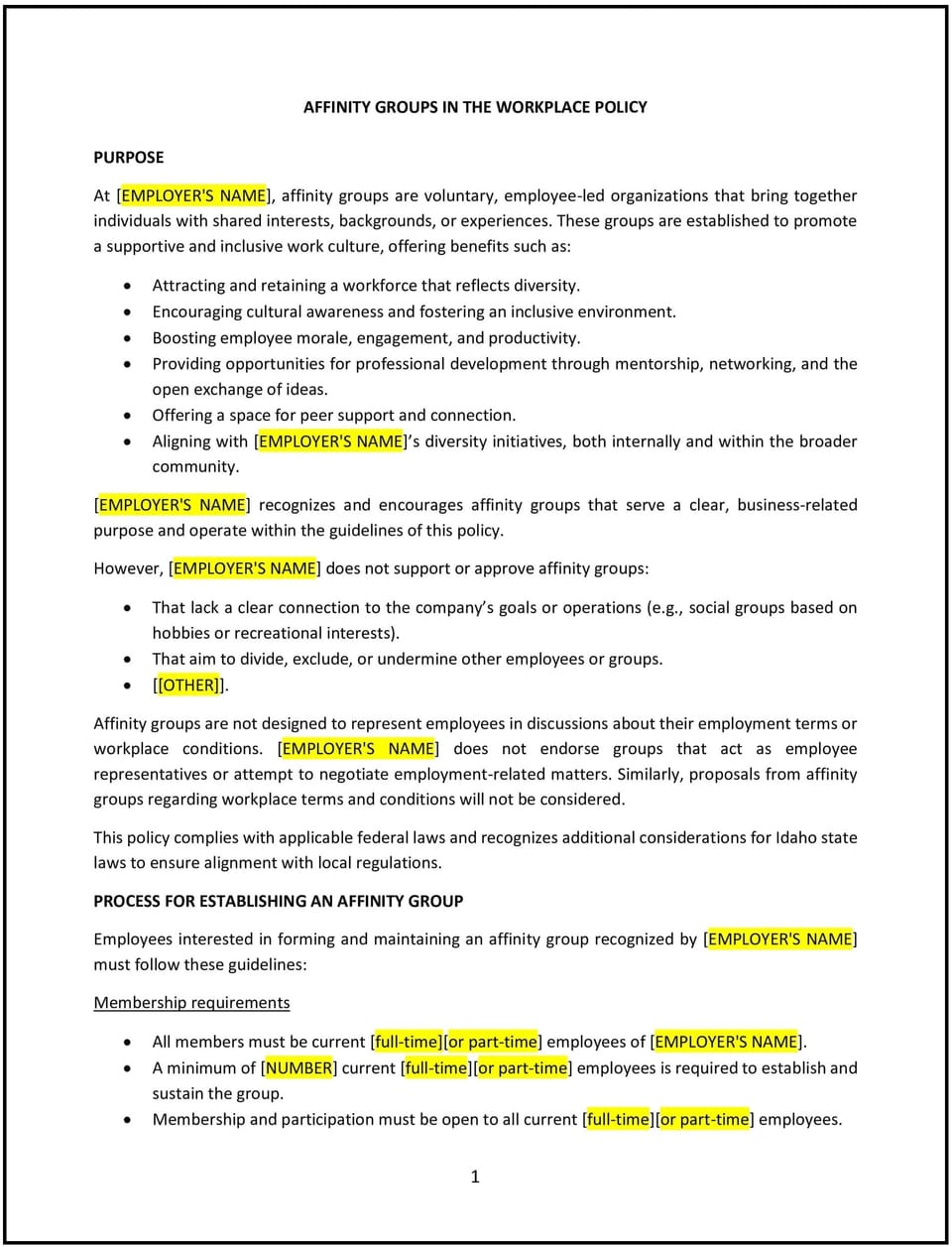Affinity groups in the workplace policy (Idaho): Free template

Affinity groups in the workplace policy (Idaho)
An affinity groups in the workplace policy helps Idaho businesses create structured employee-led groups that focus on shared experiences, interests, or identities, such as gender, ethnicity, or professional development. This policy outlines the process for forming these groups, the guidelines they must follow, and the company’s commitment to fostering a diverse and inclusive workplace. It also ensures that these groups align with business objectives, such as improving employee engagement, promoting collaboration, and enhancing workplace culture.
By implementing this policy, businesses in Idaho can build a more inclusive environment where employees feel valued and supported, leading to stronger teamwork, higher morale, and increased productivity.
How to use this affinity groups in the workplace policy (Idaho)
- Define the purpose of affinity groups: Establish the role of affinity groups in providing employees with a platform to connect, share experiences, and contribute to a more inclusive workplace. The policy should clarify that these groups aim to enhance employee engagement, retention, and overall company culture.
- Set criteria for forming groups: Outline the requirements for creating an affinity group, such as a minimum number of participants, the approval process, and oversight from HR or management. Ensure the policy reflects the company’s values and mission in Idaho.
- Emphasize inclusivity: Specify that all affinity groups must remain open and welcoming to employees, even those who do not belong to the group’s primary identity focus. This supports diverse perspectives and ensures the groups align with broader inclusivity goals.
- Detail allowed activities: Provide guidance on permissible activities for affinity groups, such as hosting educational workshops, organizing networking events, or collaborating on community projects. These activities should complement the company’s objectives and not interfere with business operations.
- Encourage respectful interactions: Emphasize confidentiality and respect for privacy within affinity groups, particularly when discussing sensitive topics. The policy should establish behavioral expectations to maintain a safe and respectful environment for all participants.
- Align with company goals: Ensure affinity groups’ activities support the business’s strategic objectives, including promoting diversity, enhancing employee well-being, and fostering professional growth. The policy should encourage collaboration between groups and other business units to achieve shared goals.
- Provide necessary resources: Detail the resources available to affinity groups, such as meeting space, funding, or access to leadership for guidance. These resources help empower groups to make meaningful contributions to workplace culture.
Benefits of using this affinity groups in the workplace policy (Idaho)
This policy provides numerous benefits for Idaho businesses:
- Promotes diversity and inclusivity: By supporting affinity groups, businesses encourage the celebration of diverse backgrounds and perspectives, creating a more inclusive workplace environment.
- Increases employee engagement: Affinity groups offer employees opportunities to connect and build relationships, enhancing job satisfaction, loyalty, and overall morale.
- Attracts and retains talent: A strong commitment to diversity and inclusion helps businesses attract top talent and improve retention rates by creating a supportive environment.
- Strengthens workplace culture: Affinity groups contribute to a collaborative and respectful workplace by fostering open dialogue, mutual understanding, and recognition of differences.
- Encourages professional growth: Through events and initiatives, affinity groups offer opportunities for employees to develop leadership skills, expand networks, and enhance their professional capabilities.
- Reflects commitment to inclusivity: Adopting this policy demonstrates the business’s dedication to creating an equitable workplace, which can also support alignment with Idaho state guidelines and federal regulations regarding equal opportunities.
Tips for using this affinity groups in the workplace policy (Idaho)
- Communicate the policy effectively: Share the policy with employees through onboarding materials, training sessions, or internal communication channels to ensure everyone is aware of its purpose and implementation process.
- Foster openness and respect: Encourage employees to engage with affinity groups and respect diverse perspectives, ensuring a welcoming atmosphere for everyone.
- Evaluate group performance: Regularly assess the impact of affinity groups on business goals, such as employee engagement and workplace culture, to ensure alignment with company objectives.
- Offer continuous support: Provide consistent access to resources like meeting spaces, event funding, or leadership mentorship to help affinity groups succeed.
- Review the policy periodically: Update the policy as necessary to reflect the evolving needs of the business, workforce, or changes in Idaho laws and best practices for diversity and inclusion.
Q: Why should Idaho businesses adopt an affinity groups policy?
A: This policy helps businesses foster an inclusive environment, improve employee engagement, and enhance workplace culture, ultimately benefiting employees and the organization.
Q: What kinds of affinity groups can employees create?
A: Employees can form groups based on shared characteristics or interests, such as gender, race, disability, or other personal identities, provided the groups remain inclusive and align with the company’s values.
Q: How can businesses support affinity groups?
A: Businesses can support affinity groups by offering resources such as meeting spaces, funding, and leadership guidance to help them achieve their goals.
Q: What activities can affinity groups organize?
A: Affinity groups can host networking events, educational workshops, community initiatives, or other activities that align with company objectives and promote inclusivity.
Q: How does this policy promote inclusivity?
A: By requiring affinity groups to remain open to all employees, the policy ensures diverse perspectives and supports a culture of respect and collaboration.
Q: How often should the policy be reviewed?
A: The policy should be reviewed annually or as needed to stay aligned with evolving workforce needs, Idaho laws, and industry best practices.
Q: What happens if an affinity group’s activities conflict with company policies?
A: If a group’s activities conflict with company policies, the business can intervene to ensure alignment with its values and objectives, as outlined in the policy.
This article contains general legal information and does not contain legal advice. Cobrief is not a law firm or a substitute for an attorney or law firm. The law is complex and changes often. For legal advice, please ask a lawyer.


